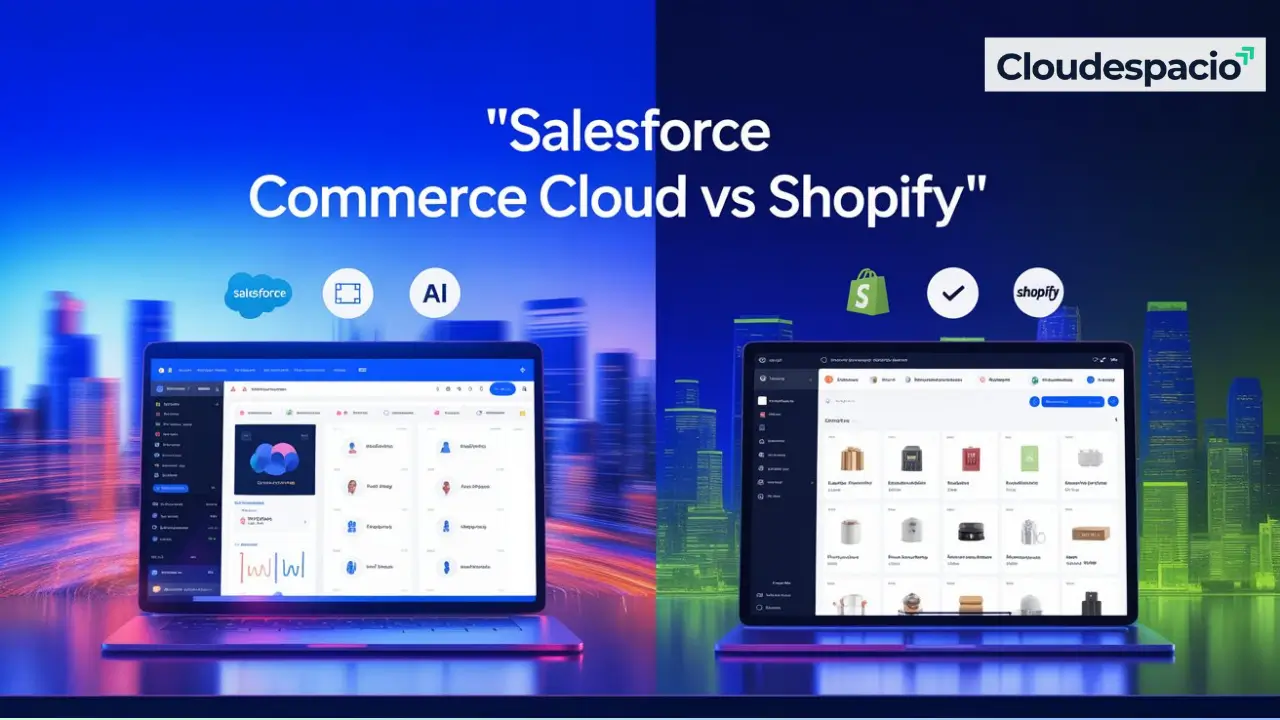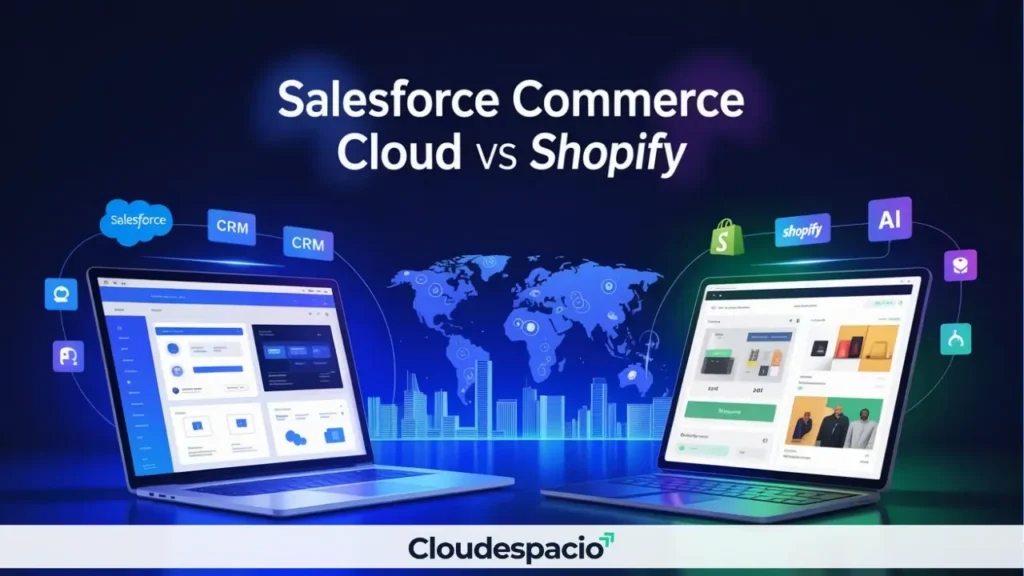


If you are narrowing down your choices between Salesforce Commerce Cloud vs Shopify, you’re not alone. When it comes to eCommerce, these two names pop up in almost every serious conversation – and for good reason.
But it doesn’t mean they serve the same kind of business.
It’s all about flexibility, deep integrations, and control tailored to you. The other emphasizes ease, speed, and simplicity. Where you are in your growth journey – and where you want to go next – will dictate the right choice.
Salesforce Commerce Cloud was originally known as Demandware. They acquired Demandware and made it a great commerce engine that integrates with Salesforce’s CRM, service and marketing tools.
Today, it acts as a complete solution for companies running multi-brand, multi-region or high-volume operations. This isn’t a plug-and-play tool. It is created for scale, a foundation you build on.
When Shopify first launched, setting up an online store was as easy as using their software and did not require a hefty technical setup. Shopify Plus – A giant player in D2C retail, especially after its launch for high-growth businesses.
People love it because it is easy to create a website, more and more apps can be integrated into it, and you can have a site up and running in a matter of days, even hours.

Salesforce Commerce Cloud is designed to handle the complexities of expansion across countries, product lines, and currencies.
It manages large catalogs, numerous storefronts and heavy traffic – often simultaneously.
Shopify is powerful but tends to be more rigid. Although you can scale on it, you may need workarounds or third party tools to expand globally and enterpriser level.
Shopify has flexible templates, but you’re working with a rigid template. That’s good for speed and consistency but restrictive if you need something special.
Almost everything can be customized with Salesforce Commerce Cloud. While you can create headless commerce setups, link up to bespoke services, and finely tune business logic, it does need developers.
The SFCC system is advantageous if your business already uses Salesforce CRM or Marketing Cloud. There’s no patching needed because customer data, marketing triggers and service cases stay connected.
In contrast, Shopify works with a wide range of apps. However, you’ll often be cobbling together point solutions and syncing data by hand or through some middleware.
Need to launch fast? Shopify wins. You can set up a basic store in a day and a branded Shopify Plus experience in a few weeks.
With SFCC, the process is longer. Planning, customizing, and possibly third-party support is needed. The fund outcome is a storefront that has been specifically built for your business logic.
Shopify’s strength lies in its simplicity. For things like recommending products, loyalty programs and handling taxes outside of the USA, you will need apps.
Salesforce Commerce Cloud has many features that already come in-built like Einstein AI-powered customization, multi-site, and advanced inventory management tools.
Shopify offers clear pricing on a monthly basis, but there are extra costs for apps, themes and transaction fees. Over time, these add-ons can add up.
Salesforce Commerce Cloud typically incurs higher development and integration costs upfront and utilizes a revenue-share model. But bigger operations may get better value, over a longer term, with fewer third-party tools.
It depends on how you define value and whether you’re investing in depth or speed.
Go with Salesforce Commerce Cloud if.
Choose Shopify if.
Is your goal speedier production or easier long-term transition?
Use Shopify for speed. If you want to build a digital foundation for the long-term, go with SFCC.
Would you prefer total customization over every detail or using a pre-built system?
Full control? Pick SFCC. Prefer structure? Shopify will serve you well.
Is your business already using Salesforce tools?
If that’s the case, SFCC is a smart next step as it comes with out-of-the-box native integration.
How much do you expect to grow internationally?
SFCC manages complexity seemingly better for use case.
Do you have a team to manage developer-heavy customization, or do you need a low-maintenance tool?
Lean teams love Shopify. Developer-backed teams get more out of SFCC
In 2025, successful companies don’t just use popular tools – they use systems suited to how they work. Platform fit is more important than features. The eCommerce landscape has shifted. The choice should be made not on the easiest or trendiest things, but on what supports your strategy, your stack, and your scale.
Salesforce Commerce Cloud provides deep value if you’re building a multi-channel experience tied into marketing automation and support workflows. Shopify allows you to move frictionlessly when you are fast-moving, testing products, and building a D2C brand with a small team. so here our Salesforce Commerce Cloud vs Shopify comparison over.

Cloudespacio, headquartered in Singapore, is a prominent independent Salesforce and leading consulting firm, dedicated to prioritizing client satisfaction.
Copyright © 2025 All Rights Reserved. Designed by Navpatra.

If you have a project in mind, let’s talk!